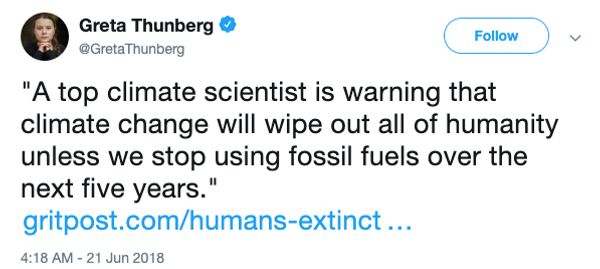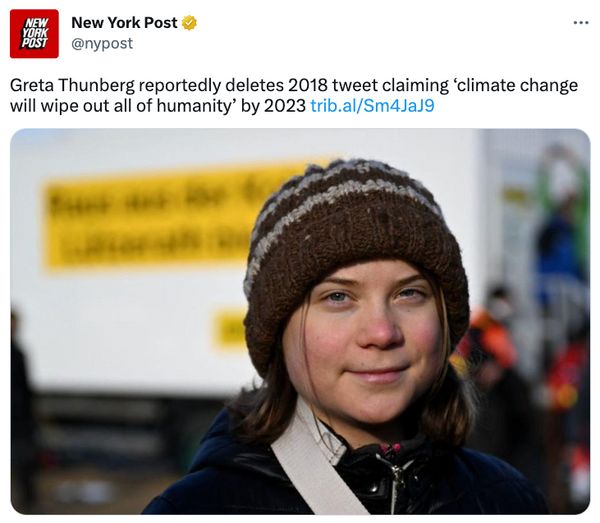Thunberg did delete a tweet from her account from 2018 that read, "A top climate scientist is warning that climate change will wipe out all of humanity unless we stop using fossil fuels over the next five years." However ...
... This tweet, and the underlying article, never actually asserted that humanity would end in the year 2023.
In March 2023, several media outlets and conservative pundits began sharing images of what they described as a deleted 2018 tweet from climate activist Greta Thunberg's account. That tweet, quoting from a now-deleted article, said, "A top climate scientist is warning that climate change will wipe out all of humanity unless we stop using fossil fuels over the next five years."

Climate skeptics jumped on the deleted tweet as evidence of climate alarmism, insinuating that Thunberg's tweet suggested that, if climate science was accurate, humanity should be extinct at the time of this reporting.

Several problems exist with that narrative. First and foremost is the fact that the tweet and the article it linked to never said that humanity would vanish in 2023. Second, and also of crucial importance, is the "top climate scientist" referenced in the underlying article never actually said what these reports asserted him to have said. Here, Snopes untangles the controversy.
Did Thunberg Delete the Tweet?
Yes, on June 21, 2018, Thunberg tweeted a link to a now deleted article on the website GritPost bearing the headline, "Top Climate Scientist: Humans Will Go Extinct if We Don't Fix Climate Change by 2023." The GritPost article rehashed content originally published on Forbes about a seminar given by James Anderson, a Harvard University professor of atmospheric science, at the University of Chicago in 2018.
As reported by Forbes, Anderson's talk focused on the need for a massive effort to curb climate change over the next five years:
People have the misapprehension that we can recover from this state just by reducing carbon emissions, Anderson said in an appearance at the University of Chicago. Recovery is all but impossible, he argued, without a World War II-style transformation of industry—an acceleration of the effort to halt carbon pollution and remove it from the atmosphere, and a new effort to reflect sunlight away from the earth's poles. This has to be done, Anderson added, within the next five years.
The assertion that humanity would collapse as a result of this inaction stemmed from statements Forbes attributed to Anderson about declining Arctic ice:
"The chance that there will be any permanent ice left in the Arctic after 2022 is essentially zero," Anderson said, with 75 to 80 percent of permanent ice having melted already in the last 35 years. "Can we lose 75-80 percent of permanent ice and recover? The answer is no."
Based on Internet Archive records, the GritPost article to which Thunberg linked was deleted sometime after July 2020. Thunberg deleted her tweet sometime after Mar. 7, 2023. Thunberg did not respond to Snopes' request for comment.
Did the Tweet Say What People Claim It Said?
The claim that a top climate scientist allegedly predicted the collapse of humanity in 2023 has been popular with climate skeptics since Anderson allegedly made the claim in 2018. The Forbes article and Thunberg tweet were both widely lampooned for their alarmism at the time. When 2023 came and humanity still persisted, these same actors were ready to relish the moment, as summarized by Newsweek:
[Charlie] Kirk, founder of Turning Point USA, on March 12, 2023, wrote: "One of the best headlines of the year so far... 'Greta Thunberg deletes 2018 tweet saying world will end in 2023 after world does not end.'"
Filmmaker [Dinesh] D'Souza, on March 12, 2023, added: "Climate Radical Greta Thunberg Caught Red Handed: Deletes 2018 Tweet That Says World Will End Without Action by 2023."
[Brigitte] Gabriel, founder of ACT for America, on March 11, 2023, also said: "Greta Thunberg deleted this tweet because it exposes her for being a fraud. Make sure the entire world sees it."
All of these tweets misread the claim repeated by Thunberg, GritPost, and Forbes. The point, as these individuals or outlets reported, was that humanity had to reach certain carbon emission benchmarks by 2023, or else catastrophic events decades to centuries later would be guaranteed because of feedbacks in the climate system. As Forbes described:
The answer [to the question "can we lose 75-80 percent of permanent ice and recover"] is no in part because of what scientists call feedbacks, some of the ways the earth responds to warming. Among those feedbacks is the release of methane currently trapped in permafrost and under the sea, which will exacerbate warming. Another is the pending collapse of the Greenland ice sheet, which Anderson said will raise sea level by 7 meters (about 23 feet).
Conflating the years scientists claim to be so-called "tipping points" with the year in which the end result of those tipping points is supposed to emerge is a rhetorical tactic common in climate-denial circles. Snopes has previously reported on the imprecise quotes contained in a 1989 Associated Press article misused in a similar way.
Did the Climate Scientist Say What the Tweets Said?
Regardless of any Thunberg tweet, the claim allegedly made by Anderson that "the chance that there will be any permanent ice left in the Arctic after 2022 is essentially zero" has also recently been shared as evidence of climate "fraud," suggesting Anderson made a failed prediction:
The Forbes article was the only place in which the content of Anderson's seminar was reported, but Anderson told The Associated Press that he never made that argument, and that his words were wildly misinterpreted in media reports:
"That is a complete fabrication of what I said," Anderson wrote, referring to the claims he said humanity would be wiped out in five years.
He said that during the seminar, he was displaying the most recent observations of Arctic sea ice volume — specifically the ice floating on the Arctic Ocean — and made the statement that "the current observed rate of floating ice loss volume, there will be no floating ice remaining by 2022."
The focus of the statement was on the floating ice volume and the observed rate of disappearance at that time, he said.
"Thus the statement was clear to those in attendance that the reference was to floating ice volume in the data shown on the slide, not arctic ice in general," Anderson clarified, adding, "so, the 'wiping out of humanity by 2022' is a total distortion of what I said or meant at the University of Chicago colloquium in 2018. I would never make such a statement."
The Bottom Line
Thunberg deleted a tweet that repeated an imprecise paraphrase of a climate scientist's 2018 seminar talk. While it is factual that she deleted this tweet, claims that the tweet argued humanity would end in 2023 are false. As such, we rate this claim as a "Mixture" of truth.

